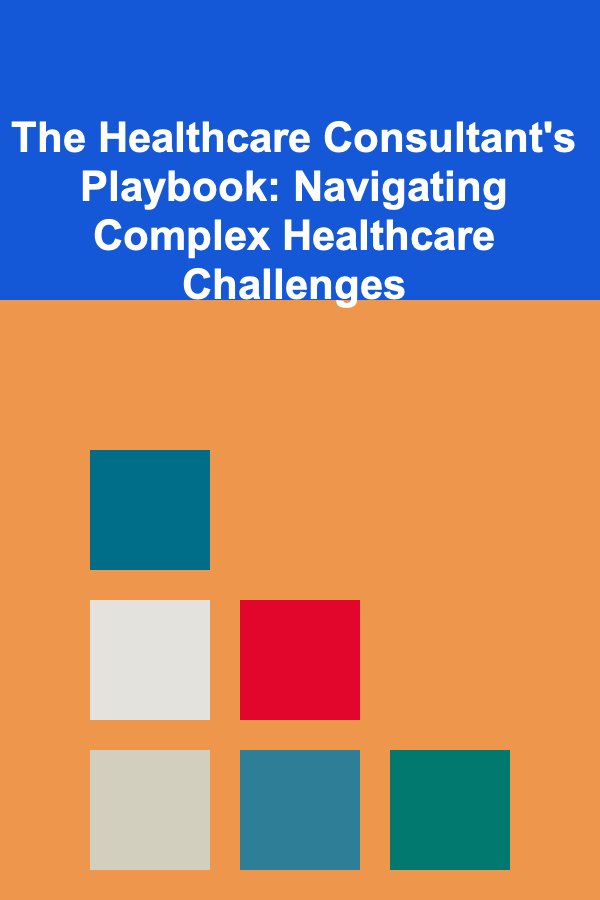
The Healthcare Consultant's Playbook: Navigating Complex Healthcare Challenges
ebook include PDF & Audio bundle (Micro Guide)
$12.99$6.99
Limited Time Offer! Order within the next:

Healthcare is a dynamic and increasingly complex industry. With new technologies, evolving regulations, and changing patient expectations, organizations face an array of challenges that demand expertise, adaptability, and strategic insight. Healthcare consultants play a crucial role in helping organizations navigate these challenges, optimize operations, and enhance the quality of care they deliver. This playbook serves as an actionable guide for healthcare consultants to tackle these issues and guide healthcare organizations toward sustainable success.
Understanding the Healthcare Landscape
Before diving into specific strategies, it's important to understand the broader healthcare environment. Healthcare is affected by multiple factors, including technological advancements, policy changes, financial pressures, and evolving patient demographics. Consultants must be well-versed in these factors to effectively assist organizations in achieving their goals.
The Shifting Healthcare Environment
Several key trends are shaping the healthcare landscape:
- Aging Populations: With the global population aging, there is an increasing demand for healthcare services, particularly chronic disease management and long-term care.
- Technological Innovation: The integration of new technologies such as artificial intelligence (AI), telemedicine, and electronic health records (EHRs) is transforming how healthcare is delivered.
- Regulatory Changes: Governments worldwide are increasingly focused on improving healthcare quality while controlling costs, resulting in more stringent regulations and value-based care models.
- Cost Pressures: Healthcare organizations are under pressure to improve operational efficiency and reduce costs while maintaining high-quality care standards.
- Patient-Centered Care: The shift towards more patient-centric approaches is emphasizing personalized care, improving patient experience, and involving patients in decision-making.
For consultants, understanding these trends is essential for identifying the right solutions for healthcare organizations. Now, let's explore actionable strategies that consultants can employ to address these challenges.
Strategy 1: Optimizing Healthcare Operations
Healthcare organizations operate in complex environments, with many departments, stakeholders, and processes to manage. Inefficiencies can lead to increased costs, lower patient satisfaction, and ultimately, poor outcomes. Consultants play a key role in streamlining operations and ensuring that healthcare organizations function as efficiently as possible.
Process Mapping and Workflow Optimization
The first step in optimizing operations is understanding the existing workflows. Process mapping helps visualize how tasks, information, and patients flow through the system. This enables consultants to identify bottlenecks, redundancies, and areas of waste.
Actionable Steps:
- Map Patient Flow: Begin by mapping the flow of patients from admission to discharge. This will help identify any inefficiencies, delays, or unnecessary steps in the process.
- Analyze Administrative Processes: Many healthcare organizations rely on outdated administrative workflows. Streamline processes such as billing, scheduling, and patient registration to reduce errors and improve operational speed.
- Implement Lean Principles: Lean principles focus on eliminating waste and optimizing value. Healthcare consultants can help implement lean strategies in non-clinical areas, such as reducing unnecessary paperwork, improving staff scheduling, and enhancing supply chain management.
Automation and Technology Integration
Automation is key to optimizing healthcare operations. By introducing advanced technologies, consultants can help organizations automate repetitive tasks, improve accuracy, and enhance overall efficiency.
Actionable Steps:
- Automate Scheduling and Appointments: Implement intelligent scheduling systems to reduce wait times and ensure that resources (staff, rooms, equipment) are used efficiently.
- Adopt Robotic Process Automation (RPA): Use RPA to automate administrative tasks such as billing, insurance verification, and claims processing, freeing up staff to focus on more complex tasks.
- Integrate EHRs with Other Systems: Ensure that Electronic Health Records (EHRs) are integrated with other clinical systems (laboratory, radiology, pharmacy) for seamless data exchange. This reduces redundancy and enhances care coordination.
Strategy 2: Enhancing Patient-Centered Care
The focus on patient-centered care is not just a trend but a necessary shift in how healthcare is delivered. Patients today are more informed and active in their care decisions, which means healthcare providers must adopt practices that prioritize the patient experience.
Care Coordination and Multidisciplinary Teams
One of the challenges in delivering patient-centered care is fragmented care, where patients see multiple specialists who may not communicate with each other. Care coordination, where multidisciplinary teams work together to manage a patient's care, can greatly improve outcomes.
Actionable Steps:
- Create Care Teams: Organize care teams that include doctors, nurses, social workers, and specialists who can work together to address all aspects of a patient's needs.
- Implement Health Information Exchanges (HIEs): HIEs facilitate communication between different healthcare providers, ensuring that critical patient information is shared across the continuum of care.
Personalized Care and Patient Involvement
Patients want to be involved in decisions about their care. Personalized care plans that consider a patient's unique needs, preferences, and circumstances can result in better health outcomes and improved satisfaction.
Actionable Steps:
- Develop Patient-Centered Care Plans: Work with healthcare providers to develop treatment plans that are tailored to the individual's specific health goals, cultural values, and preferences.
- Incorporate Patient-Reported Outcomes (PROs): PROs provide valuable insights into a patient's quality of life and treatment preferences, which can be used to guide clinical decisions.
Strategy 3: Navigating Financial Challenges
Healthcare organizations often face significant financial challenges, from rising costs to shrinking reimbursement rates. Healthcare consultants can help organizations manage costs, increase revenue, and improve financial sustainability.
Cost Reduction Strategies
Cost management is a critical concern for healthcare organizations. Consultants can help identify areas where expenses can be reduced without compromising the quality of care.
Actionable Steps:
- Optimize Supply Chain Management: Improve purchasing and inventory management to reduce waste. This includes negotiating better deals with suppliers, reducing excess inventory, and using just-in-time procurement systems.
- Outsource Non-Core Functions: Non-clinical functions such as billing, IT support, and human resources can often be outsourced to reduce overhead costs. Consultants can assess which areas are suitable for outsourcing.
- Analyze Operational Costs: Use data analytics to identify high-cost areas of the organization and recommend process improvements. For example, reducing patient readmission rates can lead to significant savings.
Transitioning to Value-Based Care
The healthcare industry is moving toward value-based care, where providers are reimbursed based on the quality of care they deliver rather than the volume of services. This shift can be challenging, but it offers opportunities for long-term sustainability.
Actionable Steps:
- Adopt Bundled Payment Models: Under a bundled payment model, a healthcare provider receives a single payment for all services related to a specific procedure or condition. This incentivizes providers to work together to deliver high-quality, cost-effective care.
- Focus on Preventive Care: Preventive care reduces the long-term costs associated with chronic conditions, hospitalizations, and emergency room visits. Consultants can help healthcare organizations implement wellness programs, screenings, and disease management initiatives to reduce costs while improving patient outcomes.
Strategy 4: Embracing Technology and Innovation
Technological innovation is one of the most transformative forces in healthcare. Consultants must help organizations leverage new technologies to improve efficiency, enhance care quality, and engage patients more effectively.
Implementing Telemedicine
Telemedicine has become an essential tool for delivering care remotely. By incorporating telemedicine into their services, healthcare providers can increase access to care, reduce wait times, and improve patient satisfaction.
Actionable Steps:
- Expand Telehealth Services: Help healthcare organizations expand their telemedicine offerings to include virtual consultations, remote monitoring, and follow-up care.
- Ensure Compliance with Regulations: Ensure that telemedicine services comply with regulatory requirements, including patient privacy laws and reimbursement policies.
Leveraging Artificial Intelligence and Data Analytics
AI and data analytics can provide valuable insights into patient care and organizational performance. Consultants can help healthcare organizations implement AI-driven tools to improve clinical decision-making and operational efficiency.
Actionable Steps:
- Implement Predictive Analytics: Use AI-powered predictive analytics tools to identify at-risk patients, forecast healthcare demand, and optimize staffing levels.
- Adopt Clinical Decision Support Systems (CDSS): CDSS can help clinicians make evidence-based decisions by providing real-time data and insights during patient encounters.
Strategy 5: Cultivating a Culture of Continuous Improvement
Healthcare organizations need to foster a culture of continuous improvement to stay competitive and provide the highest quality care. This requires ongoing training, performance monitoring, and a commitment to innovation.
Employee Training and Development
Healthcare staff are the backbone of the system. Continuous training and development are essential for maintaining high standards of care and ensuring that staff remain motivated and up-to-date with the latest practices.
Actionable Steps:
- Provide Ongoing Education: Develop training programs that keep healthcare providers updated on new technologies, treatment protocols, and best practices.
- Encourage Cross-Disciplinary Collaboration: Promote collaborative learning across departments and specialties to improve knowledge sharing and teamwork.
Performance Monitoring and Feedback
Implementing robust performance monitoring systems allows healthcare organizations to track progress, identify areas for improvement, and celebrate successes.
Actionable Steps:
- Set Key Performance Indicators (KPIs): Establish KPIs for clinical quality, patient satisfaction, and operational efficiency. Regularly review these metrics to track performance.
- Create a Feedback Culture: Encourage a feedback loop where employees can provide input on processes and suggest improvements.
Conclusion
Healthcare consultants play a pivotal role in helping organizations navigate the challenges of an ever-evolving industry. By focusing on strategies such as operational optimization, patient-centered care, financial management, technology adoption, and continuous improvement, consultants can guide healthcare organizations toward a future of sustainable success and high-quality patient care. The key to success lies in understanding the complexities of the healthcare system, adapting to change, and continuously striving for excellence in every aspect of healthcare delivery.

How to Create a Change Management Checklist for Software Implementation
Read More
How to Make Money Online as an Agile Coach? 10 Actionable Ideas
Read More
How to Organize a Clutter-Free Entryway in Small Homes
Read More
How to Explore GameFi and the Future of Gaming
Read More
How to Develop AR for Construction Sites
Read More
Integrating Blockchain with IoT Devices: A Deep Dive
Read MoreOther Products

How to Create a Change Management Checklist for Software Implementation
Read More
How to Make Money Online as an Agile Coach? 10 Actionable Ideas
Read More
How to Organize a Clutter-Free Entryway in Small Homes
Read More
How to Explore GameFi and the Future of Gaming
Read More
How to Develop AR for Construction Sites
Read More